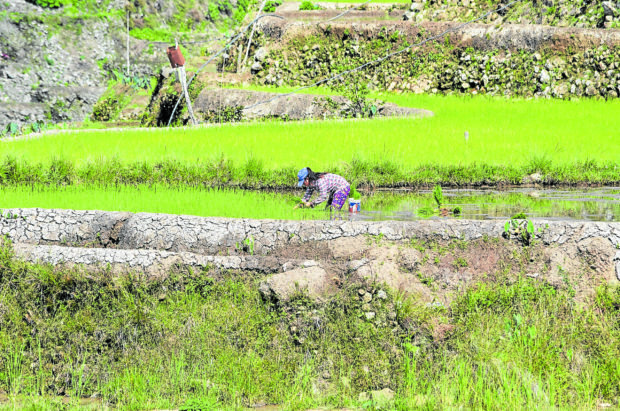
NATIVE RICE Only native rice varieties are planted in the terraces of Maligcong in Bontoc town, a popular tourist destination in Mountain Province. Some Cordillera towns are planning to promote agriculture areas in an effort to attract tourists once travel restrictions are lifted. —KARLSTON LAPNITEN
BAGUIO CITY, Benguet, Philippines — The forests of the Cordillera will soon become “therapy destinations” for people after community lockdowns are eased, while farms carved out of the mountains in Benguet and Ifugao provinces will offer tutorials for growing food.
These are new reasons to travel to the north as tourism officials start to create a transition program for 8,000 displaced hotel workers and residents who lost businesses due to the Luzon quarantine.
The lockdown and the ban on tourism events already cost the region up to P1.4 billion in lost income based on the average expenses of nearly 2 million visitors in 2019 and this year’s projected summer revenue, said Jovita Ganongan, director of the Department of Tourism (DOT) in the Cordillera.
Every tourist stays for approximately one and a half days at a holiday spot in the region, spending P2,700 daily, Ganongan said.The estimated loss covers accommodation facilities and does not include subsidiary expenses on food and souvenir items, or the amount spent on taxicabs and other public transport systems.“Most towns have adjusted quickly because their primary economies are oriented around agriculture,” Ganongan said.
Social distancing
Hit hard by the travel ban are Baguio City, Banaue town in Ifugao, which hosts the world famous rice terraces, and Sagada town in Mountain Province, she said. Baguio tourism represents 77 percent of the region’s travel output.
Also suffering from absent guests is Barangay Buscalan in Tinglayan town, Kalinga province, which has become an alternative destination because of its celebrity resident, tattoo artist Whang-od.Unless a cure or vaccine for the new coronavirus disease (COVID-19) is discovered, social distancing will keep most people away from tourist spots in the near future, Ganongan said.
She said a visit to Cordillera “means much more than a snapshot such as presenting our mountains as destinations for relieving quarantine trauma.”People staying at home for months will need some release so the mountains can now serve as “wellness sites,” she said, adding that “we imagine how many lowland families need that breath of fresh air.”
Due to the restraints on movement, Ganongan said the biggest lesson from the quarantine was the people’s need to learn how to grow their own food.Farm tourism
When Baguio canceled the crowd-drawing Panagbenga (Baguio Flower Festival) in March, the DOT drafted a plan to tap farm tourism as an alternative tourist program.
But instead of showcasing farming, the program can be used to teach visitors how to develop their backyards into vegetable gardens so families can be self-sufficient in food, she said.Except for Baguio, many Cordillera tourist towns have shifted to general community quarantine due to zero to low COVID-19 prevalence.
Ganongan said community workers left in the cold could help rebuild, or upgrade popular spots like the rice terraces, some of which are already worn-out and need repair before the monsoon season.
Many idled terraces could be reactivated, given the increased need for food, she said.